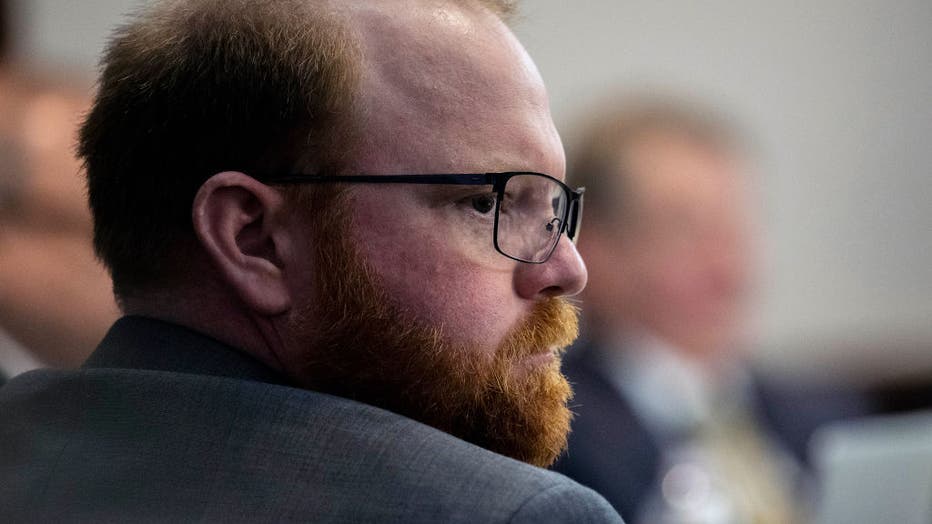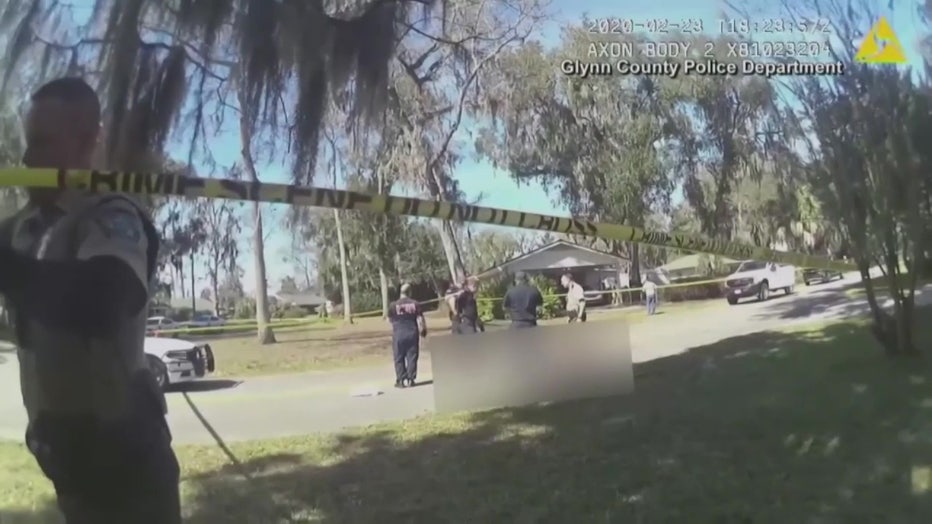Greg, Travis McMichael sentenced to life for federal hate crimes in Ahmaud Arbery's murder

Ahmaud Arbery killers sentenced for federal hate crimes
The family of Ahmaud Arbery believes justice has been served as the three men found guilty of federal hate crimes went for sentencing. The three men: Travis McMichael, his father Greg, and neighbor William Roddie Bryan, went separately before the federal judge in Brunswick on Monday.
GLYNN COUNTY, Ga. - The white man who fatally shot Ahmaud Arbery after chasing the 25-year-old Black man in a Georgia neighborhood and his father were sentenced Monday to life in prison for committing a federal hate crime.
Travis McMichael, 3,6 was sentenced by a U.S. District Court judge in the port city of Brunswick. His punishment is largely symbolic, as McMichael was sentenced earlier this year to life without parole in a Georgia state court for Arbery’s murder.
McMichael was one of three defendants convicted in February of federal hate crime charges. His father, Greg McMichael, and neighbor William "Roddie" Bryan had sentencing hearings scheduled later Monday.
Greg McMichael, 66, was also sentenced to life in prison.
William "Roddie" Bryan was sentenced to 35 years. Bryan recorded the video of the shooting.
"I’m very proud to say we finally got justice for Ahmaud on the Federal level," Wanda Cooper-Jones said.
The family of Ahmaud Arbery emerged from the federal Courthouse in Brunswick Monday feeling victorious.
"I just want to give glory to God that justice has been pouring down for Ahmaud because it’s been a long journey for my family," Marcus said.
"I wanted them to know the pain we the family goes through every day," Cooper-Jones said.
"A young man is dead. Ahmaud Arbery will be forever 25. And what happened a jury found happened because he’s Black," said U.S. District Court Judge Lisa Godbey Wood.
Judge Godbey Wood scheduled back-to-back hearings to individually sentence each of the defendants, starting with Travis McMichael, who blasted Arbery with a shotgun after the street chase initiated by his father and joined by a neighbor.
Before the two sentencings, Wood heard from members of Arbery’s family. His mother, Wanda Cooper-Jones, said that every day she feels every shot fired at her son.
"It’s so unfair, so unfair, so unfair that he was killed while he was not even committing a crime," she said.
Greg McMichael addressed the Arbery family, saying their loss was "beyond description."
"I’m sure my words mean very little to you but I want to assure you I never wanted any of this to happen," he said. "There was no malice in my heart or my son’s heart that day."
Arbery’s Mother says it’s been a difficult journey since her sons death.
"I prayed for this day where I could talk to Travis directly. I was anxious to see if he was going to address the parents of Ahmaud or family of Ahmaud and Travis choose not to even say he was sorry," Cooper-Jones said.
Last week Travis and Greg McMichael asked a judge to send them to Federal prison to serve their terms as they claim they fear violent attacks in State Prison. A judge rejected the plea.
"You’re asking for mercy and asking the court to send you somewhere where you can be laid back when we aren’t going to see Ahmaud anymore. You didn’t give him a chance to be laid back," Marcus Arbery said.
Outside the courtroom, Cooper-Jones responded to his statement.
"I think he realizes that he made some horrible decisions. Unfortunately, his apology doesn’t bring back my son," she said.
Travis McMichael declined to address the court, but his attorney, Amy Lee Copeland, said her client had no convictions before Arbery’s slaying and had served in the U.S. Coast Guard. She said a lighter sentence would be more consistent with what similarly charged defendants have received in other cases, noting that the officer who killed George Floyd in Minneapolis, Derek Chauvin, got 21 years in prison for violating Floyd’s civil rights, though he was not charged with targeting Floyd because of his race.
Greg McMichael’s attorney, A.J. Balbo, also cited the Chauvin sentence as well as his client’s age and health problems, which he said include a stroke and depression.
Prosecutor Bobbi Bernstein said Chauvin at least had some legitimate authority to engage Floyd initially.
"Greg McMichael had absolutely no legitimate reason to run inside and get a gun and chase after a young man who was doing nothing other than running down the road," Bernstein said.
Arbery’s killing on Feb. 23, 2020, became part of a larger national reckoning over racial injustice and killings of unarmed Black people including George Floyd in Minneapolis and Breonna Taylor in Kentucky. Those two cases also resulted in the Justice Department bringing federal charges.
"The evidence we presented at trial proved ... what so many people felt in their hearts when they watched the video of Ahmaud’s tragic and unnecessary death: This would have never happened if he had been white," Christopher Perras, another prosecutor, said Monday.
William "Roddie" Bryan, 52, who recorded cellphone video of Ahmaud Arbery's killing, received 35 years in prison for his part.
LAWYER: ARBERY SHOOTER FEARS HE'LL BE KILLED IN STATE PRISON
McMichael, his father Greg McMichael and neighbor William "Roddie" Bryan face possible life sentences after a jury convicted them in February of federal hate crimes, concluding that they violated Arbery’s civil rights and targeted him because of his race. All three men were also found guilty of attempted kidnapping, and the McMichaels face additional penalties for using firearms to commit a violent crime.

Gregory McMichael (left), his son Travis McMichael and William Bryan (right).
All three defendants have remained jailed in coastal Glynn County, in the custody of U.S. marshals, while awaiting sentencing after their federal convictions in January.
Because they were first charged and convicted of murder in a state court, protocol would have them turned them over to the Georgia Department of Corrections to serve their life terms in a state prison.
In court filings last week, both Travis and Greg McMichael asked the judge to instead divert them to a federal prison, saying they won’t be safe in a Georgia prison system that’s the subject of a U.S. Justice Department investigation focused on violence between inmates.
Arbery’s family has insisted the McMichaels and Bryan should serve their sentences in a state prison, arguing a federal penitentiary wouldn’t be as tough. His parents objected forcefully before the federal trial when both McMichaels sought a plea deal that would have included a request to transfer them to federal prison. The judge ended up rejecting the plea agreement.

Travis McMichael sits with his attorneys before the start of closing arguments to the jury during the trial of Ahmaud Arbery's killers at Glynn County Superior Court on November 22, 2021 in Brunswick, Georgia. (Photo by Stephen B. Morton-Pool/Getty I
A federal judge doesn’t have the authority to order the state to relinquish its lawful custody of inmates to the Federal Bureau of Prisons, said Ed Tarver, an Augusta lawyer and former U.S. attorney for the Southern District of Georgia. He said the judge could request that the state corrections agency turn the defendants over to a federal prison.
The McMichaels armed themselves with guns and jumped in a truck to chase Arbery after spotting him running past their home outside the port city of Brunswick on Feb. 23, 2020. Bryan joined the pursuit in his own truck, helping cut off Arbery’s escape. He also recorded cellphone video of Travis McMichael shooting Arbery at close range as Arbery threw punches and grabbed at the shotgun.
The McMichaels told police they suspected Arbery had been stealing from a nearby house under construction. But authorities later concluded he was unarmed and had committed no crimes. Arbery’s family has long insisted he was merely out jogging.

Still, more than two months passed before any charges were filed in Arbery’s death. The McMichaels and Bryan were arrested only after the graphic video of the shooting leaked online and the Georgia Bureau of Investigation took over the case from local police.
During the February hate crimes trial, prosecutors fortified their case that Arbery’s killing was motivated by racism by showing the jury roughly two dozen text messages and social media posts in which Travis McMichael and Bryan used racist slurs and made disparaging comments about Black people. A woman testified to hearing an angry rant from Greg McMichael in 2015 in which he said: "All those Blacks are nothing but trouble."
Defense attorneys for the three men argued the McMichaels and Bryan didn’t pursue Arbery because of his race but acted on an earnest — though erroneous — suspicion that Arbery had committed crimes in their neighborhood.
The Associated Press contributed to this report

